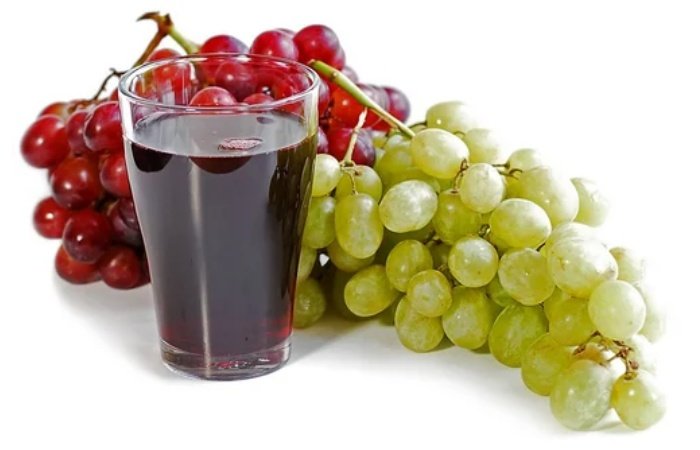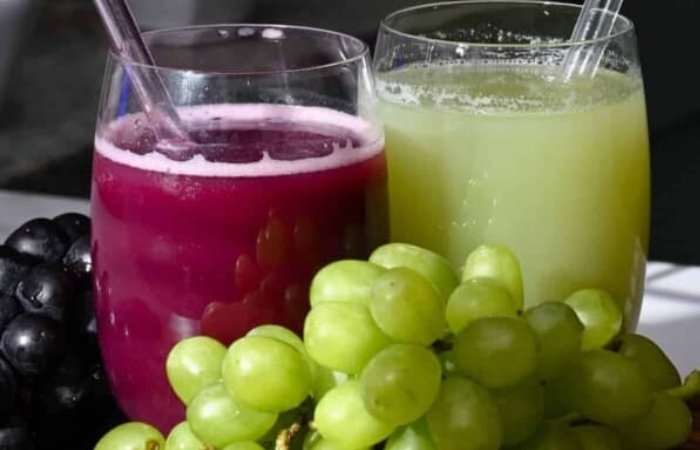Grape juice is produced by crushing and blending grapes into a liquid form. In the wine industry, grape juice that includes 7–23 percent of pulp, skins, stems, and seeds is commonly referred to as must. The natural sugars in grape juice make it a versatile ingredient that can be used as a sweetener, or fermented to create wine, brandy, or vinegar.
What is Grape Juice?
Grape juice stands out for its unique color, flavor, and aroma. This non-fermented juice can be preserved through proper treatment. When fresh, it undergoes alcoholic fermentation, it transforms into wine, one of the world’s most beloved beverages. The bioactive compounds and properties of differ slightly from those of wine. Let’s explore the properties, potential uses, and side effects.
It is a delightful and nutritious beverage made from the extraction of liquid from grapes. Known for its vibrant color and sweet flavor, grape juice is enjoyed by people of all ages. It’s a non-fermented drink packed with vitamins, minerals, and antioxidants, making it a healthy choice for many. Whether consumed on its own or used as a base for other beverages, grape juice offers a refreshing taste and numerous health benefits.
Nutritional Profile
| Nutrient | Amount Per 1 cup (253 g) | % Daily Value* |
|---|---|---|
| Calories | 152 | |
| Total Fat | 0.3 g | 0% |
| Saturated fat | 0.1 g | 0% |
| Cholesterol | 0 mg | 0% |
| Sodium | 13 mg | 0% |
| Potassium | 263 mg | 7% |
| Total Carbohydrate | 37 g | 12% |
| Dietary fiber | 0.5 g | 2% |
| Sugar | 36 g | |
| Protein | 0.9 g | 1% |
| Vitamin C | 0% | |
| Calcium | 2% | |
| Iron | 3% | |
| Vitamin D | 0% | |
| Vitamin B6 | 5% | |
| Cobalamin | 0% | |
| Magnesium | 6% |
*Percent Daily Values are based on a 2,000 calorie diet. Your daily values may be higher or lower depending on your calorie needs.
Properties of Grape Juice
Extensive research has highlighted several potential properties of grape juice:
- Anti-inflammatory: Grape juice might help reduce inflammation.
- Platelet Aggregation: It may possess properties that influence platelet aggregation.
- Oxidative Stress Reduction: Grape juice might aid in reducing oxidative stress.
- Cardiovascular Health: It could potentially support heart health.
- Lipid-Lowering: Grape juice may have hypolipidemic effects, helping to lower lipid levels.

Health Benefits of Grape Juice
Although there is no definitive evidence regarding the health effects of grape juice, current studies suggest several potential benefits:
- Oxidative Stress Reduction: A 2017 study by Cheng et al. indicated that grape juice might help reduce oxidative stress due to its antioxidant activity. It could enhance the enzymatic activity of certain enzymes like SOD and GP, thereby potentially reducing oxidative stress in the body. However, further research is needed to confirm these effects.
- Cholesterol Management: An animal study in 2018 suggested that might help lower blood lipid levels, possibly due to its bioactive compounds. More human studies are necessary to understand its effects on cholesterol. Always consult a doctor for cholesterol diagnosis and treatment.
- Liver Health: Several studies have shown that grape juice might benefit the liver, potentially due to its lipid-lowering effects. This property may be attributed to the bioactive compounds. However, more research is required to confirm its effects on humans. Consult a doctor if you suspect any liver conditions.
- Anti-Inflammatory Effects: A 2016 study by Seymour and Bolling on mice found that grape juice might possess anti-inflammatory properties. Compounds in it might interfere with inflammation pathways, potentially reducing inflammation. Further research is needed to validate these claims.
- Neurological Health: Recent studies by Hakova et al. (2020), Cicero, Ruscica, and Banach (2019), Rameshrad et al. (2019), and Sun et al. (2008) suggest that grape juice contains resveratrol, a bioactive compound that might protect against neurological diseases like Alzheimer’s and Parkinson’s. However, extensive research is required to support these claims.
How to Make Grape Juice?
Making it at home is a simple process that ensures you get a fresh, pure drink free from preservatives and added sugars.
Ingredients Needed:
- Fresh grapes (preferably seedless)
- Water
- Sugar or honey (optional, for added sweetness)
- Lemon juice (optional, for a tangy twist)
Step-by-Step Recipe:
- Preparation:
- Select fresh, ripe grapes. Wash them thoroughly under running water to remove any dirt and pesticides.
- Blending:
- Place the cleaned grapes in a blender. Add a small amount of water to help with blending.
- Blend the grapes until you get a smooth mixture.
- Straining:
- Pour the blended mixture through a fine-mesh strainer or cheesecloth into a large bowl. This step removes the pulp and seeds, leaving you with smooth juice.
- Press the pulp with a spoon to extract as much juice as possible.
- Sweetening (Optional):
- If you prefer a sweeter juice, add sugar or honey to taste. Stir until completely dissolved.
- For a hint of tanginess, add a few drops of lemon juice and mix well.
- Chilling:
- Transfer the juice to a pitcher and refrigerate for at least an hour before serving. Chilled grape juice is incredibly refreshing.

Tips for the Perfect Juice
- Use ripe, high-quality grapes for the best flavor.
- Adjust the sweetness according to your taste preference.
- Ensure all equipment used is clean to maintain the juice’s freshness.
- For a smoother juice, strain the mixture twice.
Variations and Add-ons
Grape juice is versatile and can be enhanced with various add-ons:
- Mint: Add fresh mint leaves while blending for a refreshing twist.
- Ginger: A small piece of ginger can add a zesty flavor and extra health benefits.
- Berries: Blend in some strawberries or blueberries for a mixed fruit juice.
- Spices: A pinch of cinnamon or nutmeg can add warmth and depth to the flavor.
Serving Suggestions
- Serve it chilled in a tall glass with ice cubes for a refreshing summer drink.
- Use it as a base for mocktails or cocktails.
- Pair it with breakfast or as a healthy snack throughout the day.
Benefits Noticed by Regular Drinkers
Regular consumption offers several health benefits:
- Rich in Antioxidants: It is high in antioxidants, which help fight free radicals and reduce oxidative stress.
- Heart Health: It may improve cardiovascular health by reducing cholesterol levels and improving blood circulation.
- Anti-Inflammatory Properties: The anti-inflammatory compounds in it can help reduce inflammation in the body.
- Hydration: It helps keep you hydrated, especially during hot weather.
- Nutrient-Rich: Packed with vitamins A, C, and K, along with essential minerals, it supports overall health.
How to Use Grape Juice?
You can purchase it from the market or prepare fresh at home using the following method:
- Wash a few grapes thoroughly with water.
- Blend the grapes in a blender or mixer juicer to obtain fresh juice.
- Strain the juice using a thin cloth or strainer.
Always consult your doctor before incorporating it into your diet to ensure its safety for your health.
Side Effects
Here are some key points on the possible side effects:
- High Sugar Content:
- Grape juice contains a significant amount of natural sugars. Excessive consumption can lead to weight gain and increase the risk of developing conditions like type 2 diabetes and metabolic syndrome.
- Digestive Issues:
- Drinking large quantities of grape juice may cause digestive discomfort, including diarrhea and abdominal cramps, due to its high fructose content.
- Allergic Reactions:
- Some individuals may be allergic to grapes or grape juice, experiencing symptoms like itching, hives, swelling, or difficulty breathing. Always consult a healthcare provider if you suspect an allergy.
Precautions When Using it
Take general precautions before using it, especially when giving it to children, the elderly, pregnant women, and breastfeeding mothers. Due to insufficient evidence regarding its safety, consult a doctor before consuming it. Do not self-medicate or alter any ongoing treatment without consulting a healthcare professional.
Interactions with Other Drugs
There is not enough data to confirm whether it interacts with other drugs. More research is necessary to prove its absolute safety. Always consult your doctor before using it, especially if you are undergoing treatment or taking medications.
By understanding the properties, potential uses, and necessary precautions, you can make informed decisions about incorporating it into your diet.
Conclusion
It is not only a delicious and refreshing beverage but also a powerhouse of nutrients and health benefits. Making it at home allows you to enjoy its pure flavor and customize it to your liking. Whether enjoyed on its own, as part of a meal, or as a base for creative drinks, it is a versatile addition to your diet. Regular consumption can contribute to better health and well-being, making it a worthwhile addition to your daily routine.
FAQ’s
What is Grape Juice Good For?
Grape juice is rich in antioxidants, which help reduce oxidative stress and inflammation. It supports heart health by potentially lowering cholesterol and improving blood circulation. Additionally, grape juice can boost hydration and provide essential vitamins and minerals.
Is Grape Juice Good for Your Kidneys?
Grape juice, consumed in moderation, can support kidney health due to its hydrating properties and antioxidants. However, excessive intake might be problematic for those with pre-existing kidney conditions due to its potassium content. Always consult a healthcare provider for personalized advice.
What is Grape Juice Called?
Grape juice, simply referred to as grape juice, is the liquid extracted from grapes. In the wine industry, the unfermented juice containing pulp, skins, stems, and seeds is known as must.

